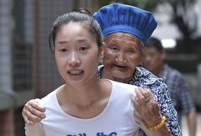 YOG kicks off in Nanjing
YOG kicks off in Nanjing
 Colorful life at Youth Olympic Village of Nanjing 2014 YOG
Colorful life at Youth Olympic Village of Nanjing 2014 YOG
 Royal Taoist temple to open to public
Royal Taoist temple to open to public
 Female soldiers at quake-hit area
Female soldiers at quake-hit area
 Shocking photos of cruel battles in Ukraine
Shocking photos of cruel battles in Ukraine
 Amphibious armored vehicle unit conducts open sea drill
Amphibious armored vehicle unit conducts open sea drill
 Water relay in Henan
Water relay in Henan
 Ethnic culture feasts eyes of travelers
Ethnic culture feasts eyes of travelers
 80 security dogs assembled in Nanjing police dog training base
80 security dogs assembled in Nanjing police dog training base
 Graffiti artists paint on street walls in Xinjiang
Graffiti artists paint on street walls in Xinjiang
BEIJING, Aug. 19 -- China on Monday reviewed a plan to reform the payment system for executives at state firms under direct central government control, the latest step by the government to reform the controversial income distribution system.
At a meeting of the Central Leading Group for Comprehensively Deepening Reforms, President Xi Jinping said unreasonably high incomes at state-owned enterprises (SOEs) will be adjusted.
"China will gradually regulate the income distribution system at SOEs to make salary levels appropriate, salary structures reasonable, and strictly manage and supervise the system," he said.
Kuang Xianming, director of the Research Center for Economy at the China Institute for Reform and Development, said the plan indicates reform has moved into a critical period affecting the country's vested interests.
China has thousands of SOEs, 113 of which are directly administered by the country's central authority. These enterprises are considered the backbone of the economy, but their inefficiency, monopolies in many areas, unchecked spending and corruption have long been a source of public complaints.
Statistics showed the average annual salary of executives at centrally administered SOEs ranged from 650,000 (105,691 U.S. dollars) to 700,000 yuan in 2010 and 2011. Considering that some SOEs prosper on state support, these salaries were unreasonably higher than those of government civil servants.
In addition to the much-envied high salaries, what has most irritated the public has been the so-called "invisible income," such as transportation and communication allowances and other material benefits that SOE officials enjoy.
"This has directly widened the income distribution gap in China," noted Kuang.
Linking income distribution reform with the Party's campaign against extravagance and other undesirable work styles, Xi on Monday stressed that apart from necessary allowed expenses, SOE executives will not enjoy personal perks.
Regulation of SOE salaries is not new. In an effort to narrow the widening gap between the rich and poor, the government announced an income distribution reform plan in February last year, stipulating that SOEs must impose ceilings on payments to state-appointed senior management as well as ensure that senior staff's salary growth is slower than the average for ordinary employees.
Compared with the broadly worded income distribution plan, the latest move proposes more detailed measures to help put real restraints on high incomes, said Ding Yuanzhu, a researcher with the Chinese Academy of Governance.
He also pointed out that the policy was just one part of the broader reforms in the SOE sector, which have centered on bringing in private capital to foster modern governance systems and develop a mixed-ownership economy.
A decision released after a key reform meeting last November pledged to actively develop a diversified ownership economy and allow more SOEs and other firms to develop into mixed ownership companies.
Since the meeting, several SOEs have taken the initiative in implementing reforms.
In February, China's top oil refiner, Sinopec, decided to restructure its lucrative distribution business and allow social and private capital to hold up to 30 percent of shares. Sinopec's move was followed by the State Grid Corporation's decision to open two business sectors in May.
But on the higher policy level, progress has been slow. Although rumors have surfaced several times that China will unveil a systematic guideline on SOE reforms, no specific timetable has been given yet.
Some media reports said earlier that the final plans would be published in September, but implementation and the launch of pilots are likely to start next year.
 Beautiful night scenery of Nanjing
Beautiful night scenery of Nanjing Passenger transport starts on Tibet's new railway
Passenger transport starts on Tibet's new railway Story of outstanding Beijing swat sniper
Story of outstanding Beijing swat sniper Beautiful policewoman in an anti-terrorism SWAT team
Beautiful policewoman in an anti-terrorism SWAT team Cute photos of little Taoist nuns and monks go viral online
Cute photos of little Taoist nuns and monks go viral online Amphibious armored vehicle unit conducts open sea drill
Amphibious armored vehicle unit conducts open sea drill A post-90s girl who takes grandma to work
A post-90s girl who takes grandma to work Beijing policewomen posters become a hit
Beijing policewomen posters become a hit The vanishing folk skills
The vanishing folk skills Intoxicating beauty of Dali, Yunnan province
Intoxicating beauty of Dali, Yunnan province Memorable moments of Ludian earthquake
Memorable moments of Ludian earthquake Bring world together to help elephant
Bring world together to help elephant 'Building Dreams'
'Building Dreams'  Labrang Monastery
Labrang MonasteryDay|Week|Month